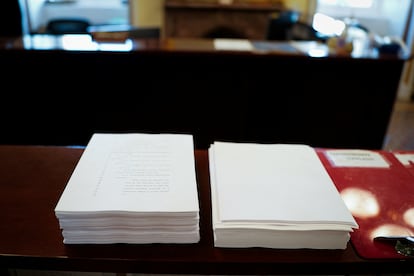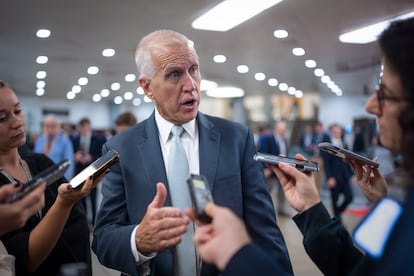The phrase, by former House Speaker Nancy Pelosi, is famous in Washington: “In Congress, we pass laws, and then we read them later.” Last Saturday, Chuck Schumer, the Democratic minority leader in the United States Senate, reversed the order of events by forcing, in a parliamentary delaying maneuver, long-suffering Senate staffers to read aloud on the floor for 15 hours the 940-page revised version of the controversial “big, beautiful bill,” published shortly before midnight on Friday.
The text—which encapsulates Donald Trump's ambitious tax and spending reform proposal and threatens to significantly increase an already spiraling public deficit—was finally approved this Tuesday, after four days of agonizing discussion on Capitol Hill, and by the skin of its teeth. It took the tie-breaking vote of Vice President J. D. Vance, who had arrived on the floor just hours earlier, anticipating that the power granted to him by the Constitution would be necessary to undo wrongs like this. Three Republican senators opposed it, leaving the score at 50-50. Vance's contribution tipped the score to a razor-thin 51-50.
The One Big Beautiful Bill (BBB), a name that only the president of the United States could have given it, is the bill Trump relies on for the success of his domestic economic agenda, hence his impatience to sign it. He has been pressuring his people on Capitol Hill for months to bite the bullet in the face of the foreseeable spending hole and the benefit cuts that will affect his constituents and push it through, and now the president wants it on his desk directly from the Capitol before the big Independence Day holiday, which is celebrated next Friday, July 4.
The move seems unlikely: after the Senate's approval, it now moves to the House of Representatives, where it was approved in May by a single vote (215-214). And the drama shows no signs of letting up. The text has changed so much along the way that it must be rediscussed, and several members of the House of Representatives, belonging to the hardline wing of the Republican Party, traditionally opposed to increased public spending, are already threatening not to support it.
In the Senate, all Democrats (47), along with three dissident Republican senators — Rand Paul (Kentucky), Thom Tillis (North Carolina) and Susan Collins (Maine) — opposed the passage of the BBB, a law that deepens the tax cuts approved in 2017, at the beginning of the first Trump Administration. The law also fulfills promises from the Republican reelection campaign, such as the elimination of taxes on tips, and allocates hundreds of billions of dollars to his mass deportation plan, as well as to the current Administration’s defense priorities.
The text plans to offset such spending with, among other things, cuts worth more than $900 billion [about €764 billion] to Medicaid, a kind of social security system for the lowest-income and disabled, and to the SNAP program, the current name for the food stamp distribution system. It won't be enough: according to calculations by the independent Congressional Budget Office, the BBB will add some $3.3 trillion over the next 10 years to the US deficit, which currently stands at $37 trillion, a record high since the pandemic.
Among the changes made during his time in the Senate to satisfy almost everyone are the creation of a $25 billion fund for rural hospitals and the elimination of exemptions for wind and solar projects, a flagship measure of the previous administration.
Voting marathon
The live reading gave way on Monday to something called Vote-o-Rama, a marathon in which the text is reviewed one last time and proposals for changes are made, which are either approved or not. This lasted about 27 hours, until the news broke that the conservative majority leader, John Thune (South Dakota), had gathered the necessary votes after a heart-stopping early morning. When the passage was confirmed, he thanked his people, visibly relieved, and passed the ball to his colleagues in the House of Representatives, who, he said, he hopes will “act quickly” and ratify a law that “meets a number of priorities: [it will provide] tax relief for workers, economic growth, a stronger defense, a more secure border, a more reliable energy supply, and a reduction in waste, fraud, and abuse by the federal government.”
Discounting the support of Paul, who opposed the rule from the outset, and Tillis, who considers the changes it will bring to Medicaid, which will leave 12 million people without coverage, intolerable, all eyes were on the doubters. Above all, on Alaska Senator Lisa Murkowski, who was courted by her colleagues in the House more in tune with Trump while she obtained controversial benefits and exceptions for her state. Nor was their focus on Senator Josh Hawley (Missouri), who had flirted with an opposition that ultimately failed to materialize. The support of Susan Collins, another undecided candidate, was counted on, so now it's time to find out what made her change her mind.

These hints of rebellion, real or merely for show, were part of a spectacle that was pure Washington. The reading of the 940 pages of the law on Sunday morning offered images that seemed like the epic-less reverse of the Washington myth of James Stewart, who droned on and on in Frank Capra's classic of political idealism Got Mr. Smith Goes to Washington (1939). A handful of long-suffering Senate employees took turns doing the task while their colleagues, already tired of sitting in their chairs, stared blankly at their own thoughts, perhaps reviewing next week's to-do list or ranking Nicolas Cage's performances from best to worst.
At night, while the senators' aides (staffers, in Capitol Hill slang, a tribe of workers exploited in the name of a mix of ambition and patriotism) called home to say they shouldn't wait up for them, the television reporters sent the same story over and over again and juggled to maintain the suspense, and the food delivery men headed their motorcycles toward the Capitol.
Musk's stellar appearance
Elon Musk, for his part, made a star-studded appearance like those actors whom the writers of a series kill off in one season and have them return from the beyond in the next as a ghostly apparition to its protagonists: the richest man in the world, with his own history of criticism of the law for its effects on the public deficit, reproaches that led him to break bitterly and spectacularly with Trump on live television about a month ago, tweeted on X on Saturday afternoon that he found the content of the reworked law “completely crazy.”
On Monday, Musk threatened to use his bottomless wallet to support those who oppose Republicans who vote yes to the BBB in the primaries, even though that would be, as dramatic as it got, the"last thing he does" before his death. He also once again fantasized about creating a third party.
Trump, for his part, didn't miss the opportunity to put on his gloves again and go to bat at his old ally. In a message on Truth, he suggested giving him a taste of his own food: applying scrutiny and cuts to the Department of Government Efficiency (DOGE), which the president had appointed Musk to head with the task of streamlining the administration. He also threatened his former"first friend" with suspending subsidies to his companies, which were heavily dependent on public funds. Speaking to reporters at the White House, Trump, true to his barroom style, later warned:"The DOGE monster can turn on Elon and eat him."

Earlier this weekend, the US president had canceled his favorite weekend plans—a golfing trip at one of his clubs, in this case in Bedminster, New Jersey—so he could spend Saturday and Sunday calling senators and pressuring them to pass the bill as quickly as possible. That pressure also extended to Truth, where he sent the following message: “To all the Republicans cutting spending, myself included, REMEMBER: You still have to get re-elected. Don’t go crazy! We will make up for it, tenfold, with [economic] GROWTH, more than ever before.”
It's the new law of the Republican Party these days: Anyone who dares to oppose the boss risks his fury and the risk of seeing the leader of the MAGA (Make America Great Again) movement unleash his forces against them. Anticipating this, Tillis, the senator from North Carolina, announced on Sunday that he would not run for re-election, which was due next year.
Once he removed that weight, he became the president's and the Washington circus's most vocal critic during the four days of Senate negotiations on the bill. In a forceful speech on the Senate floor, Tillis denounced the"hypocrisy of American politics" and those who would do "anything" to hold on to their seats.

